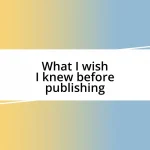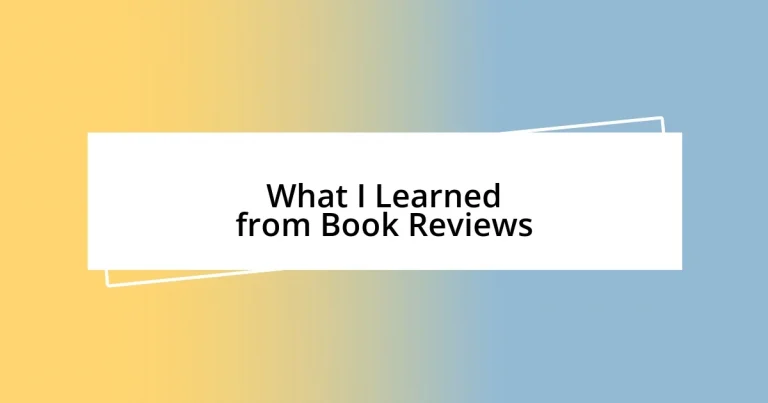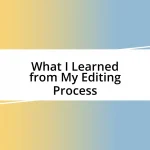Key takeaways:
- Book reviews enhance reading by offering insights into themes, styles, and emotional journeys, aiding readers in making informed choices.
- Analyzing reviews involves understanding the reviewer’s language, background, and connections to other works, deepening appreciation for literature.
- Writing personal book reviews fosters self-reflection and engagement, while structured and shared reviews can spark meaningful discussions within the reading community.
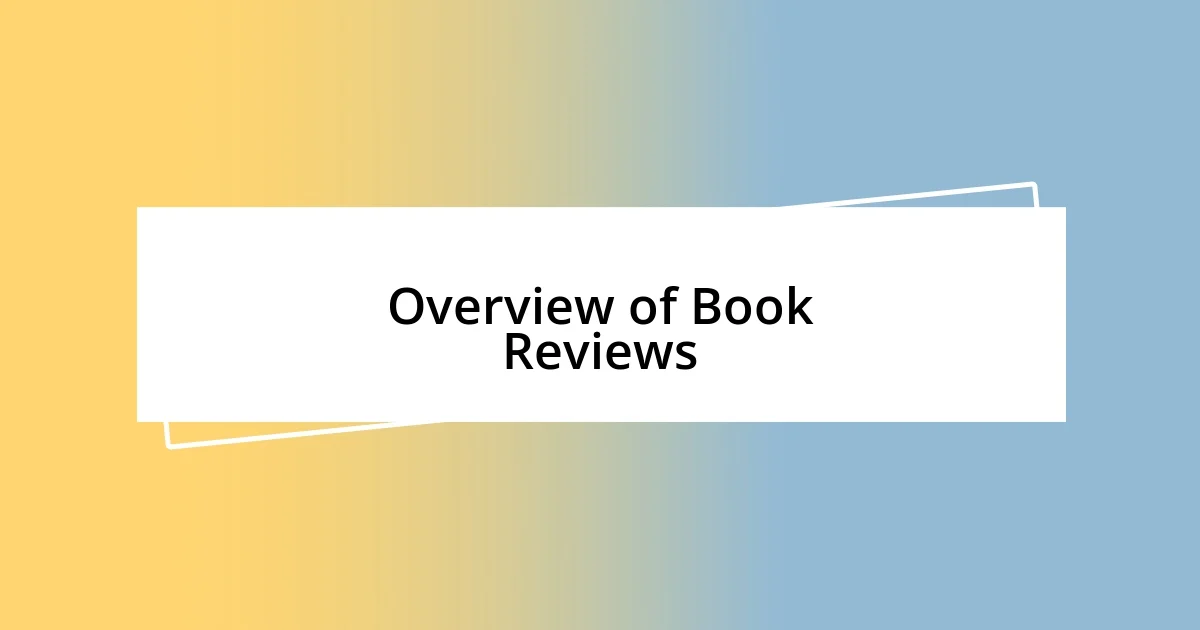
Overview of Book Reviews
Book reviews serve as a bridge between readers and literature, offering insights that can be incredibly valuable. I remember stumbling upon a review of a novel that changed my perspective entirely; it opened my eyes to themes I hadn’t noticed and made me appreciate the author’s craft on a deeper level. Have you ever read a book that felt different after you read a review? That’s the magic of a well-written critique.
In essence, book reviews provide a snapshot of a book’s core themes, style, and the emotional journey it offers. They help potential readers decide if a book aligns with their interests. I often find myself perusing reviews before diving into a new title; it’s almost like getting a friendly nudge in the right direction.
Beyond simple recommendations, reviews can spark discussions around societal and cultural contexts embedded in literature. I’ve seen reviews that highlight significant issues, prompting me to reflect on my own experiences. How often do we pause to consider how a story resonates not just with us, but with the world around us? That depth of analysis is what makes book reviews essential for nurturing a richer reading experience.
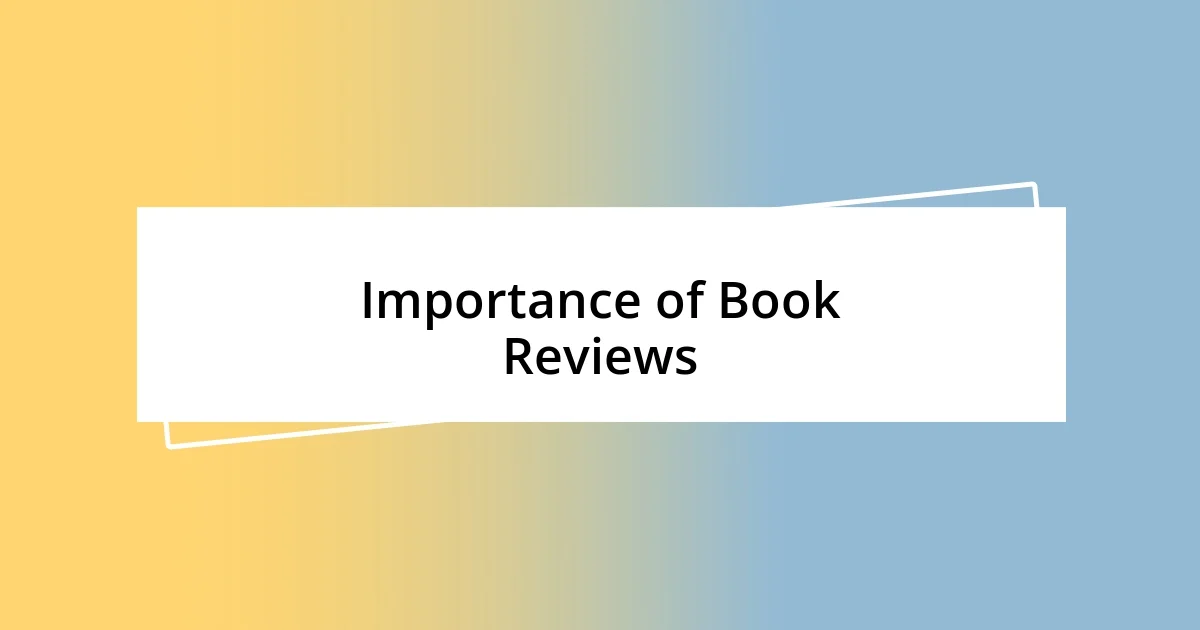
Importance of Book Reviews
Book reviews play a crucial role in shaping our reading choices, acting as a filter for the overwhelming amount of literature available today. I recall feeling lost in a sea of titles at my local bookstore until a friend’s insightful review of a debut novel caught my eye. It was like she had handed me a key to a hidden treasure; that book ended up becoming one of my favorites, thanks to her perspective.
- They help readers gauge if a book’s themes resonate with their interests.
- Reviews can illuminate the author’s style and intent, enriching the reading experience.
- A well-crafted critique can ignite curiosity and discussion about deeper societal issues, encouraging readers to engage with the text on multiple levels.
Understanding the importance of book reviews has transformed how I approach reading. With each review, I feel more connected not just to the story, but to the broader conversations surrounding it. For me, it’s not just about enjoying a good read; it’s about experiencing literature as a vibrant dialogue between the writer, the reviewer, and the reader.

Key Elements in Book Reviews
Book reviews are truly a fascinating mix of personal opinion and analytical insight. When I read a review, I’m not just looking for a thumbs up or thumbs down; I want to understand the nuances behind the author’s writing and how it resonates with readers. For example, when I came across a review of a complex historical fiction novel, the reviewer’s exploration of the character development helped me grasp the intricate layers, ultimately enhancing my reading experience. Doesn’t it feel rewarding to dive deeper into a story through someone else’s perspective?
Another crucial aspect that strikes me in reviews is the emotional connection forged between the reviewer and the text. It’s almost like a conversation where the reviewer shares their feelings, offering a shared experience for readers. I remember being particularly moved by a review that vividly described how a memoir rekindled the author’s childhood memories; it inspired me to reflect on my own past. Have you ever been nudged into introspection simply by reading someone else’s thoughts? That emotional depth often transforms a basic critique into a compelling narrative.
Finally, strong book reviews frequently outline the book’s strengths and weaknesses, providing a well-rounded perspective. I once came across a review addressing a popular fantasy series that detailed both its enchanting world-building and some pacing issues. That kind of balanced analysis helped me decide whether the book was right for me. It’s this blend of appreciation and constructive criticism that shapes the core of an impactful review.
| Key Element | Description |
|---|---|
| Themes | Insights into the book’s fundamental messages and ideas. |
| Writing Style | Analysis of the author’s tone, language, and narrative techniques. |
| Emotional Impact | Exploration of the feelings and reflections evoked in the reader. |
| Analysis of Strengths and Weaknesses | A balanced view that highlights both positive and negative aspects of the book. |
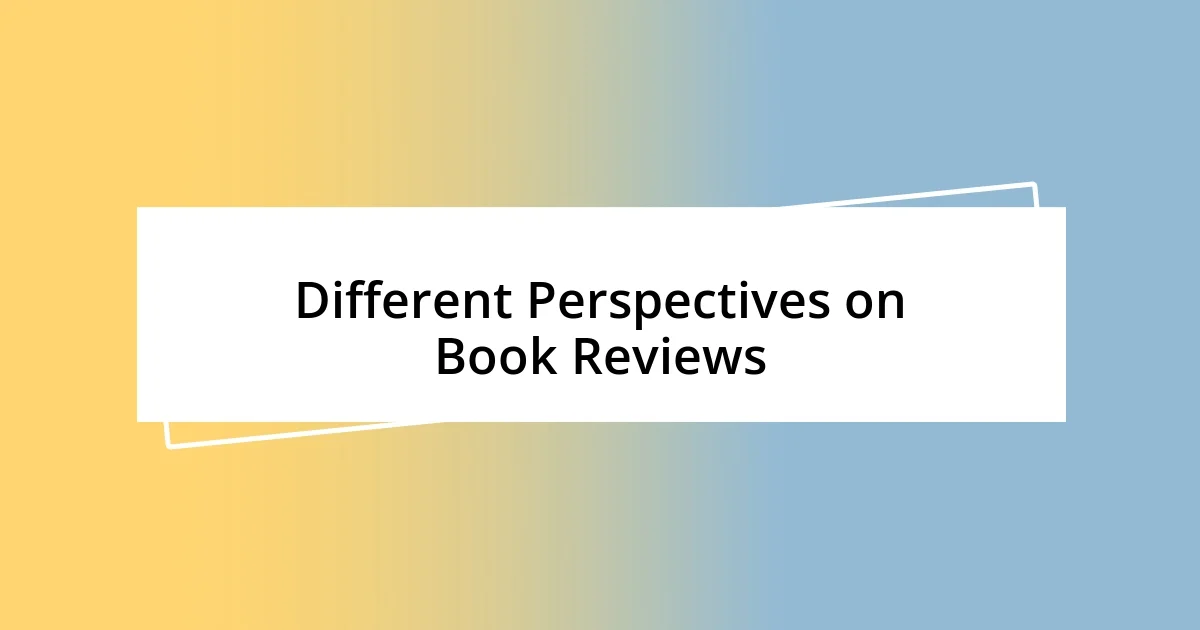
Different Perspectives on Book Reviews
When I read book reviews, I find that each critique offers a unique lens into the text—different readers focus on different elements, which can really shift my perspective. For instance, I remember reading a review that highlighted the book’s intricate plot twists while completely bypassing its character depth. This made me realize how easily one’s interpretation can hinge on personal interests; have you ever found yourself surprised by what someone else valued in a story?
Another angle that often intrigues me is the cultural context that reviewers bring. There was one review about a contemporary novel that connected its themes to current societal issues, effectively broadening my understanding of the story’s implications. It struck me how a review can transform a simple narrative into a thoughtful commentary on our world. Does it not amaze you how literature can serve as a mirror reflecting our realities?
Lastly, I appreciate how book reviews can invite readers into a communal space. I remember discussing a particular review with a friend, and the debate we had really enriched my grasp of the novel. It felt as if the review became a jumping-off point for a deeper conversation on the themes we encountered. Isn’t it fascinating how these perspectives can not only influence our reading choices but spark lively discussions among fellow book lovers?
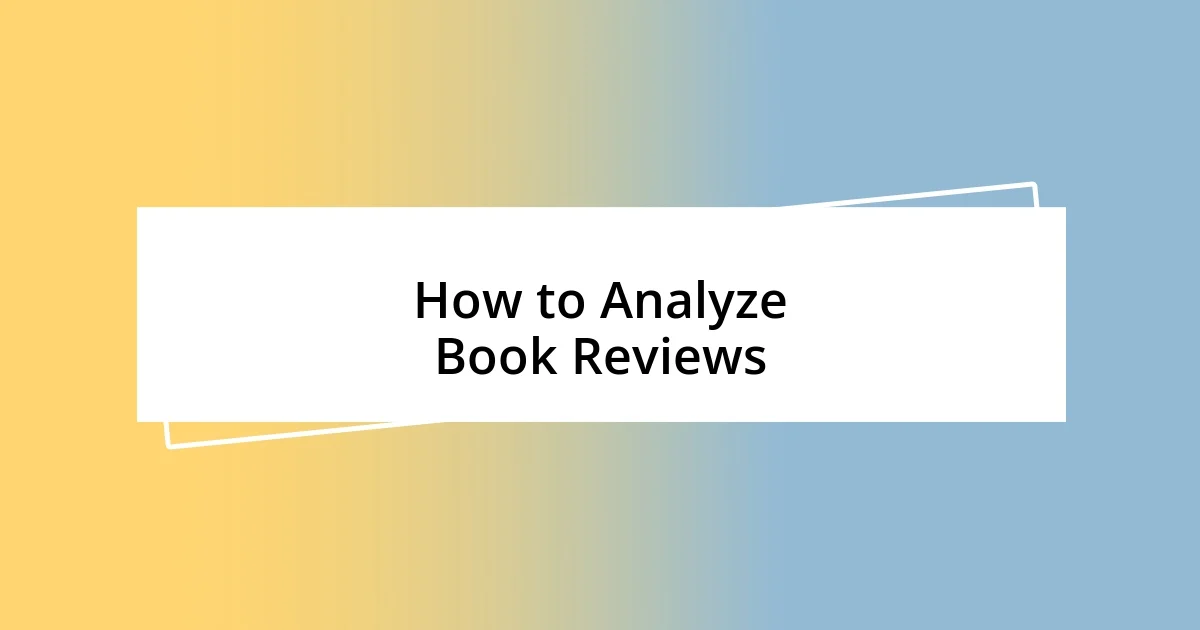
How to Analyze Book Reviews
When analyzing book reviews, it’s essential to pay attention to the language used by the reviewer. Are they enthusiastic, critical, or measured? I recall reading a review that was almost poetic in its description of a novel’s setting. The reviewer’s vivid words painted a visual picture for me; it was a reminder that the right choice of words can significantly convey the reader’s experience. How does language transform a simple opinion into a captivating narrative?
Next, I find it intriguing to consider the reviewer’s background and biases. A specific review I stumbled upon was from an author who specialized in classics, and their perspective on a modern novel was surprisingly revealing. They brought in standards I hadn’t even considered, highlighting nuances that enriched my understanding. Isn’t it enlightening to see how our experiences shape our interpretations of literature?
Lastly, I always look for the connections a review brings to other works. I remember a critique linking a new thriller to a beloved classic, and it sparked a conversation with friends about how narratives resonate across time and genre. It made me realize that a single review can broaden our reading list while deepening our appreciation for both new and old literature. Don’t you find it exciting when a review opens up a whole new world of books you hadn’t thought to explore?
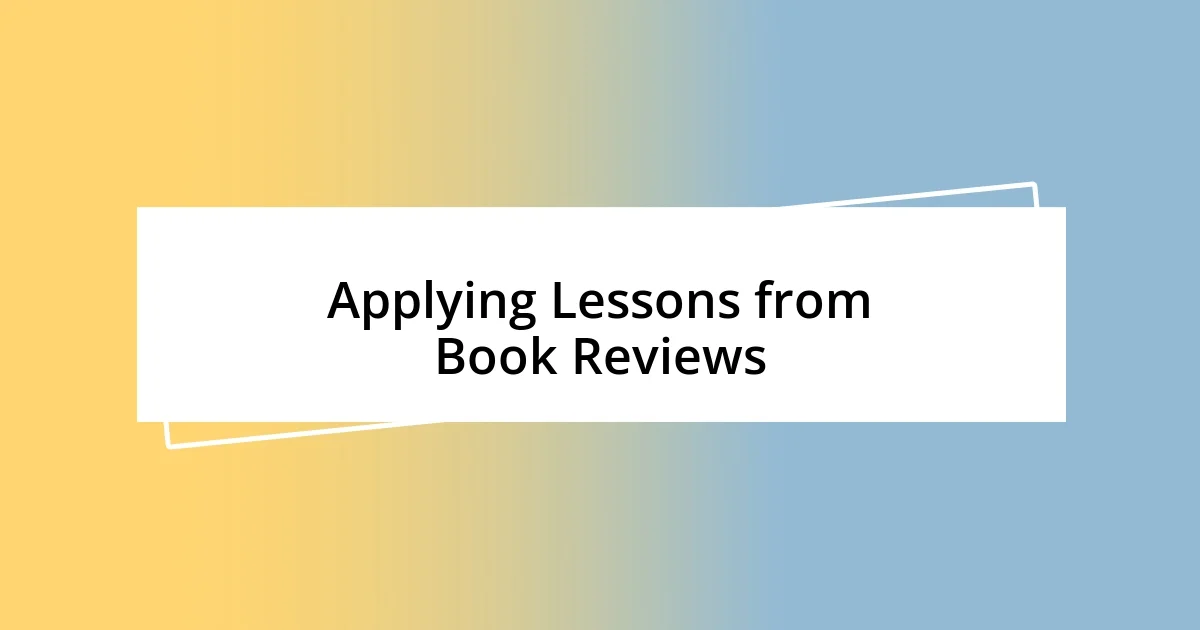
Applying Lessons from Book Reviews
Applying the lessons from book reviews helps me approach reading with a more informed mindset. There was one occasion when I came across a review that critiqued a beloved novel of mine for its pacing. Initially, I felt defensive about the book I held dear. However, after reflecting on the points raised, I revisited the novel with fresh eyes. Not only could I appreciate the pacing issues more clearly, but I also found new elements to value. Isn’t it incredible how shifting our perspective can enhance our reading experience?
One of the most profound lessons I’ve learned is the art of questioning assumptions. A review I read once pointed out a prevalent theme in a popular fantasy series that I never considered: the representation of power dynamics. It struck a chord with me, prompting me to analyze how these themes relate to real-world governance and authority. Since then, I’ve made it a habit to dig deeper into the underlying messages of novels, which has enriched my appreciation for literature, don’t you agree?
Moreover, engaging with reviews has inspired me to share my thoughts more openly. Reflecting on a particularly heated discussion following a thought-provoking review reminded me of how different interpretations can spark creativity. People would share personal stories that connected to the text, transforming our dialogue into a tapestry of thoughts and experiences. In my view, each review not only serves as a guide but also as a catalyst for conversations that deepen our connection to literature. Wouldn’t you say that the insights shared can turn a solitary reading journey into a collective exploration?

Writing Your Own Book Reviews
Writing your own book reviews can be a deeply personal experience. I remember the first time I crafted a review for a novel that moved me profoundly. I poured my emotions onto the page, from the heartache of the characters to the beauty of the prose. It was as if I was reliving my connection to the story, and I realized that expressing those feelings added a layer of depth to my writing. Have you ever felt that your feelings about a book could resonate with someone else?
As I developed my review-writing skills, I learned the importance of structure. Initially, my reviews were all over the place, a jumble of thoughts and emotions. But then I discovered that creating a clear outline, with sections for themes, character analysis, and personal impressions, made my reviews not only easier to follow but also more engaging for my readers. Isn’t it fascinating how a little organization can transform our thoughts into something cohesive?
Furthermore, sharing my book reviews on social media has opened up a world of feedback and discussion. One time, I wrote about a dystopian novel that sparked questions around societal norms, and remarkably, it led to a lively exchange on various online platforms. Hearing different perspectives helped me see that my insights were part of a larger dialogue. Don’t you find it rewarding when your opinions help generate meaningful conversations?





